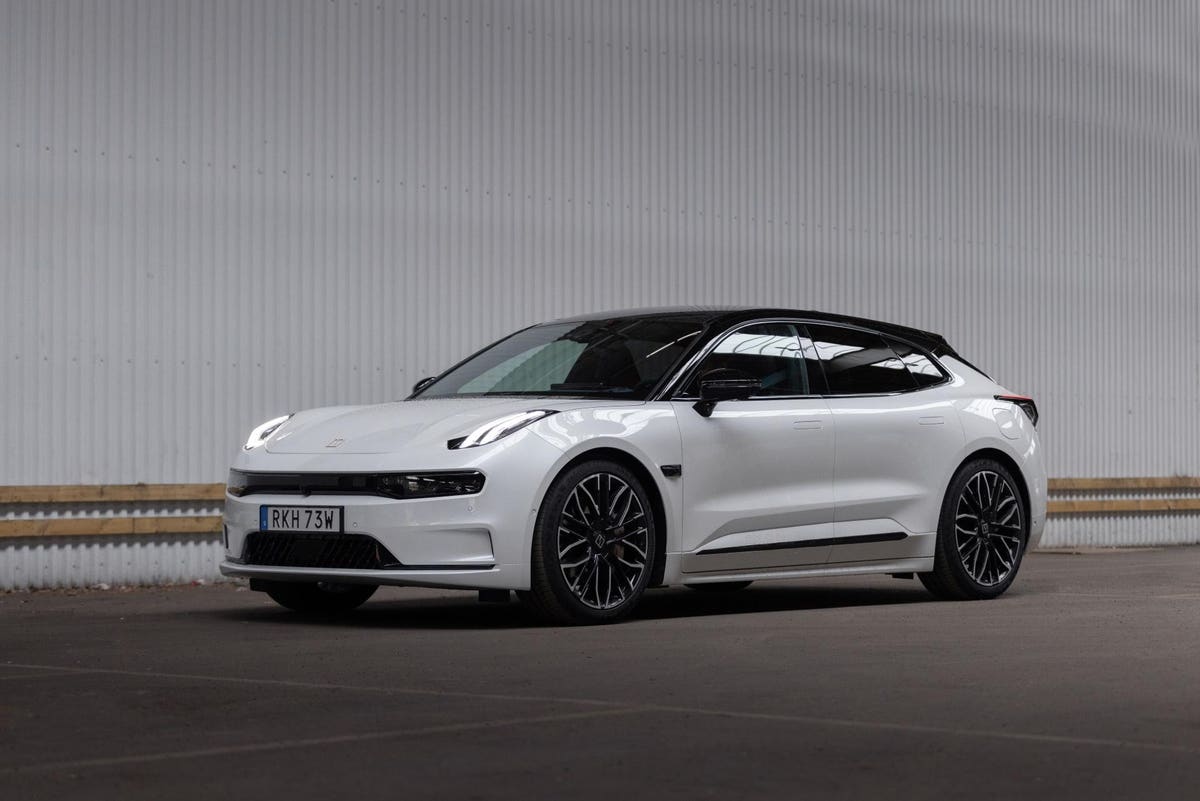This year has seen a slew of releases from Chinese carmakers in Europe. BYD has expanded its market to the UK, XPENG launched its very promising P7 and G9 in key European countries, and MG has launched a tantalizing open top EV, the Cyberster. Now we have new brand ZEEKR, except it’s not as new as you think or as Chinese as you think. I attended the launch of the flagship 001 in Gothenburg, Sweden and took it for a drive.
The ZEEKR 001 was launched in China in 2021, and in 2022 it broke two Guinness World Records for electric cars. So it has been available for a while. However, although ZEEKR’s cars are manufactured in China, their design and testing have been mostly performed in Gothenburg, and the models now arriving in Europe have been optimized for the European market. ZEEKR’s parent company, Geely, has a large facility in Gothernburg. Geely is a Chinese company, but also owns familiar European car brands, including Volvo and Lotus, plus another electric newcomer, Polestar. Link & Company is one of its brands, too.
ZEEKR 001: Homage To Porsche Panamera Cross Turismo?
If you were told the ZEEKR 001 was a fully European car, you probably wouldn’t suspect it has Chinese connections at all. It has strong Porsche Taycan or Panamera Cross Turismo vibes, which is no bad thing. ZEEKR describes the car as a “Luxury Shooting Brake”, which is another automotive term like “coupe” that has been somewhat abused in meaning over the last few years. Like a coupe, a shooting brake is supposed to have two doors, but the ZEEKR 001 has four (thankfully). It is basically what the British call an estate car and Americans a station wagon, which is a vehicle format woefully lacking in the electric market amid the slew of SUVs.
This was a deliberate strategy. “I’m glad we didn’t do an SUV as our first car,” says Spiros Fotinos, CEO of ZEEKR Europe. “The 001 does an outstanding job of saying we can transcend the SUV body type. SUVs are going to continue to be important but there are other body styles that offer more than sufficient comfort and the space that you need for 99% of the time, but with the performance so you don’t feel you’re compromising anything. We went through a long period in this industry, especially in Europe, where the answer was monotone. It was SUV. But when drag coefficient and everything that impacts range matters more, that will urge reconsideration.”
The ZEEKR 001 capitalizes on its non-SUV format to deliver a drag coefficient of just 0.23Cd. That’s the same as a Tesla Model 3. In comparison, a BMW iX has a drag coefficient of 0.26Cd, which is still quite good for an SUV. Most SUVs are even less aerodynamic, which will have a knock-on effect on efficiency and thereby range.
ZEEKR 001: Model Options
There will initially be three versions of the ZEEKR 001 in Europe. There’s a single motor Long Range RWD model with a 100kWh battery, plus two dual-motor AWD versions with the same capacity. The Performance and Privilege models have the same 400kW (544hp), 686Nm motors, enabling them to reach 100km/h (62mph) in just 3.8 seconds. That’s way off a Tesla Model S, but few other EVs are quicker. The Privilege essentially has a higher equipment level than the Performance, including air suspension, and this was the version I drove.
Although the ZEEKR 001’s acceleration is impressive, the car’s range is its most compelling feature. The single-motor car has a WLTP rating of 620km (388 miles), and this only drops to 580km (363 miles) for the dual-motor cars. ZEEKR achieves this by dynamically disengaging one of the motors when not required, to improve efficiency. The ZEEKR 001’s range is on par with a BMW iX xDrive50, which has a more than 10% bigger battery. The 001 also supports 200kW DC charging thanks to the SEA platform’s 800v capability, as well as 22kW AC. On a fast enough DC charger, it will take under 30 minutes to go from 20 to 80% battery capacity.
ZEEKR 001: Interior, Luggage Space And Technology
The 001 is very clearly aimed at the luxury market. The seat material is plush and there is full electric adjustability. The cabin, while not as spacious as an SUV like the BMW iX, still has plenty of room. The rear seats are electrically adjustable as well in the Privilege, with tri-zone air conditioning, providing comfortable transportation for four adults, or slightly less comfortable transportation for five. The rear seat controls are on the middle armrest, so won’t be accessible with a third rear passenger. There’s the obligatory panoramic sunroof to provide a greater sense of interior space.
You might think that the shooting brake format would reduce rear luggage space, but this is cavernous on the 001, and indeed more than most SUVs. With the rear seats up, you get 810 liters. Drop the rear seats down and this expands to an enormous 2,144 liters. This is more than a Tesla Model Y, and well into E-class Mercedes wagon territory.
Alongside electrification, a greater emphasis on software and connectivity is part of the automotive revolution currently taking place. ZEEKR has clearly understood this with the instrumentation and infotainment for the 001. There’s a 15.4in landscape orientation central LCD, like a Tesla Model 3 or Y. But the 001 also incorporates an 8.8in instrument panel and 14.7in HUD. There’s an eight-core Qualcomm Snapdragon processor driving everything.
The infotainment screen interface is a dead ringer for Tesla’s, with the air conditioning controls showing a similar schematic of air flow that you can simply drag to direct, instead of operating individual vents directly. The menu is logically laid out and most functions are easy to find. This is custom software, not Android Automotive as with the Volvo and Polestar systems.
The ADAS functionality is supplied by Mobileye. There are seven 8MPixel high resolution cameras and an ultra-long-range radar capable of resolving objects up to 600m away. In China, this enables Level 3 autonomous driving capabilities, but European regulations restrict functionality to Level 2+. This means steering assistance on highways but not full self-driving, putting capabilities on par with Tesla’s Autopilot. Not all functions were fully operational during my test drive, however.
ZEEKR 001: Driving Experience
With the world records for drifting and slalom handling, the ZEEKR 001 promises a driving experience above that of the average EV. The acceleration isn’t as brutal as a Tesla Model 3 or S Performance, but there’s a huge amount on tap all the way from a standing start to overtaking at highway speeds. I wasn’t able to test the latter hugely, due to the low speed limits in Sweden, but where I was able to drive at 100km/h the 001 felt extremely comfortable for longer journeys. The air suspension on the Privilege dealt easily with bumps, although Swedish roads do tend to be a cut above British ones in terms of surface quality.
Most of the roads I drove were local, and the 001 handled these well. It is a big car and weighs over 2.3 tons, but the steering is firm and decisive. The handling isn’t up with a Porsche Taycan or BMW i4, but there’s some fun to be had. The lower center of gravity than an SUV provides more confidence when approaching a corner, and of course you have that huge acceleration on tap once you’ve passed the apex. There is enough power to make opportunistic overtaking on A roads feel safe. I averaged around 3.1 miles per kWh during my test drive, which would equate to a range of 310 real-world miles. That’s impressive.
ZEEKR 001: Pricing, Warranty, And Future Markets
The ZEEKR 001 starts at 59,490 Euros (£51,000 / $65,000), with the Performance costing 62,490 Euros (£53,400 / $68,500) and the Privilege 67,490 Euros (£57,700 / $74,000). This prices the 001 above the Tesla Model Y, for example, the Performance version of which costs 59,990 Euros in the Netherlands. However, the ZEEKR 001 Performance is about as quick and has much better range. The Tesla Model S has comparable range, faster performance, but is much more expensive. Competitor models from BMW or Mercedes are also much more expensive.
ZEEKR has also taken a novel approach to its warranty. The battery guarantee has the typical eight-year duration, although this is for a generous 200,000km (125,000 miles). The general vehicle warranty, however, is for up to 10 years. This starts at five years or 100,000km (62,000 miles), but can be extended by a further five years or 100,000km if the car is serviced at a ZEEKR-approved garage each year.
Although the Gothenburg launch focused on the flagship ZEEKR 001, the more keenly priced and smaller ZEEKR X was also unveiled at the same time. The X starts at 44,990 Euros (£38,400 / $49,000). Its 69kWh battery can deliver up to 440km (275 miles) of range with the single motor RWD version. But there’s also a dual-motor AWD option with 315kW (428hp) of power, giving the car a 0-100km/h (62mph) sprint of 3.8 seconds. The X is a compact hatchback aimed at urban use but incorporates a similarly high level of technology as the 001. The rear side has strong similarities to the BMW i3.
ZEEKR is initially launching its cars in Sweden and Netherlands, with orders open now. Further Western European countries will be added in the coming months, particularly in the Scandinavian area where EVs are dominating sales. ZEEKR has an autonomous driving project in the USA with Waymo, and Fotinos sees the American market as a key one for expansion. But conspicuous by its absence is the UK. Fotinos would only commit to promising right-hand-drive ZEEKR cars “within the decade”, unfortunately. This is a huge shame, because the 001 is a great EV and is priced competitively. It has a lot of promise.
Read the full article here





